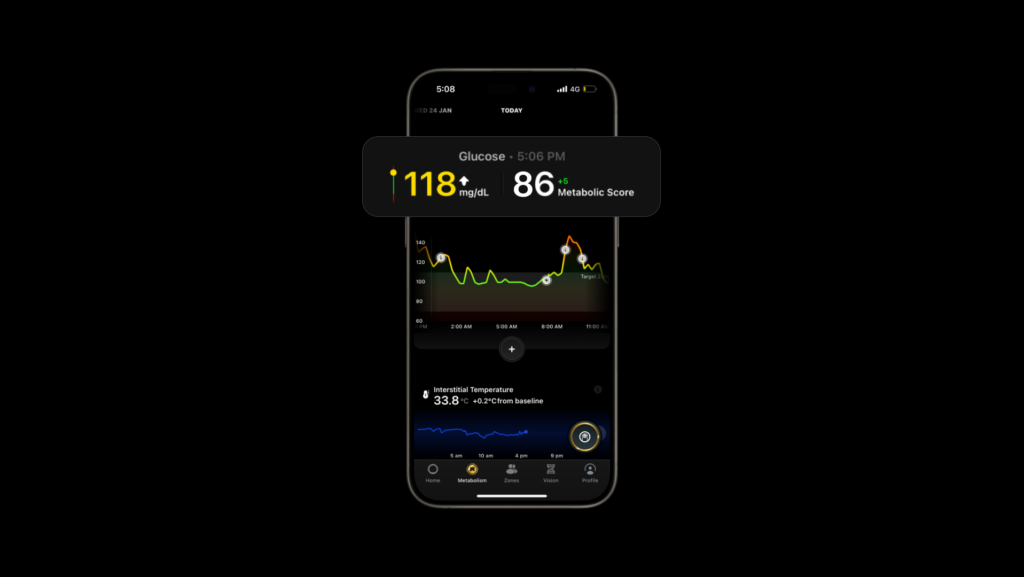The thyroid is a part of the endocrine system and its intersection with the markers of metabolic health can reveal its pervasive effects. It performs a vital role in regulating blood pressure, body temperature, heart rate, metabolism and the response of the body to other hormones.
What is the Thyroid?
The thyroid is a small, butterfly-shaped hormone-producing gland that is just below the larynx (or Adam’s apple). It is responsible for producing key hormones that modulate metabolic rate, menstrual cycle, heart rate, breathing, muscle strength, body weight, and much more.
The thyroid cells make two critical thyroid hormones, namely
- Triiodothyronine (a.k.a. T3)
- Thyroxine (a.k.a. T4).
Together they control the speed and accuracy of our metabolism.
In simpler terms, they direct your body to either speed up or slow down the breakdown of calories, based on what’s required. The thyroid gland utilises iodine from the food to generate these hormones. The thyroid gland makes the thyroid hormone by drawing iodine from the blood and integrating it into thyroid hormones.
Thyroid cells are unique since they are highly specialized in absorbing and utilising iodine. T3 and T4 meander in your bloodstream to reach almost every cell in the body. These hormones work in conjunction to tell the body’s cells how much energy to use.
How does Thyroid Stimulating Hormone(TSH) affect Metabolism?
The thyroid-stimulating hormone is made and secreted into the bloodstream by the pituitary gland. It controls the production of the thyroid hormones—thyroxine and triiodothyronine. When the thyroid-stimulating hormone binds to the receptor on the thyroid cells, these cells begin to produce thyroxine and triiodothyronine and release them into the bloodstream.
Many of your body’s cells have thyroid hormone receptors, which means that they can influence your metabolism in a host of ways. Thyroid hormones help your body burn fat and provide you with more energy.
As a result of this effect on fat metabolism, thyroid hormones bump up your basal metabolic rate (BMR), which means you’ll be burning off fat even when you’re not physically active.
BMR is the number of calories your body needs to accomplish its most basic (basal) life-sustaining functions when it is at rest. The BMR accounts for about 60 to 75% of your daily calorie expenditure
What is Hypothyroidism?
Hypothyroidism, also known as underactive thyroid disease, occurs when there is an imbalance in the thyroid hormones—TSH (thyroid-stimulating hormone), T3 (triiodothyronine) & T4 (thyroxine). A low level of thyroxine (T4) and a high level of TSH stipulates an underactive thyroid. TSH sends the message to the thyroid gland indicating the amount of T4 & T3 that need to be produced.
When the TSH levels are high, it indicates an underactive thyroid, and the pituitary gland has to put in that much more effort to stimulate your thyroid. For your metabolic health to be at an optimal level, thyroxine needs to be broken down into triiodothyronine by organs like the liver and kidney.
Endocrine System
Triiodothyronine is vital for many functions in our body such as muscle control, maintaining healthy bones, brain development, heart functions, metabolic activities and digestive functions. When thyroxine levels are low, it slows down crucial bodily functions that lead to health complications.
Circulatory System
Hypothyroidism can slow down the heart rate and weaken the heartbeat. This puts a strain on your heart to efficiently pump blood to other organs, which is why one may feel shortness of breath while exercising.
Nervous System
If hypothyroidism is left unchecked, it alters how nerves interpret information to and from the brain, giving rise to peripheral neuropathy, a result of damage to the nerves located outside of the brain and spinal cord, causing weakness, numbness and pain, usually in the hands and feet, and potentially affecting other areas and body functions including digestion, urination and circulation.
How does Hypothyroidism affect Metabolism?
Metabolism is a series of chemical processes in each cell transforming the calories we eat into fuel to keep us alive. These processes sustain life, everyday functioning and include breaking down food and drink into energy and building or repairing our bodies.
Metabolic health is described as having ideal levels of blood sugar, triglycerides, high-density lipoprotein (HDL) cholesterol, blood pressure, and waist circumference, without using medications.
Metabolic syndrome is a group of conditions that occur simultaneously, elevating your risk of heart disease, stroke and type 2 diabetes. These conditions include increased blood pressure, high blood sugar, excess body fat around the waist, and abnormal cholesterol or triglyceride levels.
A growing body of evidence points to the association between metabolic syndrome and endocrine disorders including thyroid dysfunction.
Does Hypothyroidism Cause Metabolic Syndrome/ Disorder?
Studies suggest that hypothyroidism is associated with factors of metabolic syndrome such as dyslipidemia, hypertension, obesity, and often insulin resistance.
It has been reported that 95% of newly diagnosed hypothyroid patients have increased levels of cholesterol and 5% exhibit hypertriglyceridemia. Hypothyroidism also leads to increased levels of LDL cholesterol.
All these factors are conducive to accelerated atherosclerosis, which is a disease marked by plaque build-up inside arteries. The arteries stiffen and narrow, restricting blood flow and causing blood clots, heart attack or stroke.
Does hypothyroidism cause weight gain?
One of the telltale signs of hypothyroidism is a sudden onset of weight gain. Thyroid hormones, which circulate in your body as thyroxine (T4) and triiodothyronine (T3), influence your metabolism through your fat cells, muscle, liver pancreas, hypothalamus.
By breaking down fat, these hormones (T3 & T4) promote the liver and pancreas to metabolize stored calories and use them as energy.
The hypothalamus, which is a thyroid hormone regulator in the brain, reduces the amount of TRH—thyrotropin regulating hormone (thyroid gland’s master regulator)—when a sufficient amount of thyroxine and triiodothyronine is circulating in the body.
When you have low thyroid hormone levels or minimal thyroid function, all of these functions can be disrupted. The body stores fat as a way to store calories, along with symptoms of low energy, which can be especially difficult to burn.
Insufficient production of thyroid hormone is usually associated with a low basal metabolic rate. Hence, hypothyroidism is responsible for weight gain.
Can Hypothyroidism Cause Insulin Resistance?
Thyroid hormones T3 and T4 strike a stellar balance of glucose homeostasis by functioning as insulin agonistic and antagonistic. Hypothyroidism can disrupt this equilibrium and alter glucose metabolism, which can lead to insulin resistance, a marker of impairment of metabolic health.
Insulin is a hormone created by the pancreas that controls the amount of glucose in a person’s bloodstream at any given moment. It helps store glucose in the liver, fat, and muscles, and regulates the body’s metabolism of carbohydrates, fats, and proteins. After eating, blood sugar levels rise.
Insulin released by the pancreas helps the cells to absorb blood sugar for energy and storage. With this absorption, glucose levels in the bloodstream begin to decline. The pancreas then produces glucagon, a hormone that prompts the liver to release stored sugar.
This interaction of glucagon and blood sugar ensures stable blood glucose levels in the body and the brain. The cells of individuals who have insulin resistance don’t respond well to insulin, barring glucose from entering them with ease. The glucose level in their blood rises over time even as their body produces more insulin as the cells resolutely resist insulin.

What is Hyperthyroidism?
Unlike hypothyroidism, hyperthyroidism or overactive thyroid occurs when the thyroid gland produces an excess of T3 (triiodothyronine) & T4 (thyroxine). In such cases, the TSH fails to regulate and maintain the balance.
Hyperthyroidism is predominantly caused by Grave’s disease, an autoimmune disease. In this condition, the antibodies trigger the thyroid gland to produce an excess amount of T4 & T3 hormones. Other causes include excess iodine in food, inflammation in thyroid, tumors, etc.
Some prominent telltale signs of hyperthyroidism are enlarged thyroid gland (goitre), rapid weight loss, increased appetite, protruding eyes and high blood pressure.
Vascular system
With hyperthyroidism, your heartbeat increases. You constantly feel like you’re in a race, even in a state of rest. Irregular heartbeats increase the risk of being prone to a stroke.
Bone Health
Ignoring hyperthyroidism leads to having weak and brittle bones as it interferes with your body’s capacity to incorporate calcium into your bones.
Metabolism
Excessive thyroxine in blood is known as thyrotoxicosis. Excessive presence of T3 & T4 accelerates fat metabolism, leading to rapid weight loss. This can strain the heart further. Thyrotoxicosis is also recognized by other signs like palpitations, tiredness, increased appetite, intolerance to heat, etc.
Steps That Can Be Taken To Optimise Thyroid Levels
In order to measure your thyroid levels, a thyroid test depicting TSH, T3 and T4 levels is recommended. ‘Normal levels’ of thyroid hormones may depend on the methods used to test the levels. Thyroid plays an important role and should be optimised to avoid any health complications.
1. TSH (Thyroid Stimulating Hormone) levels:
Switches in TSH levels can be seen as an “early warning sign”, since this usually occurs right before the levels of triiodothyronine and thyroxine in the body become either too high or too low.
3. T3 (triiodothyronine) Levels:
A total T3 test quantifies the bound and free fractions of triiodothyronine. T3 tests can be useful in diagnosing hyperthyroidism and seriousness of hyperthyroidism.
3. T4 (Thyroxine) Levels:
Apart from measuring the thyroxine levels, T4 levels can also be affected by prescribed medicines that change thyroid hormone binding proteins.
How does Hyperthyroidism affect Metabolism?
Hyperthyroidism causes impaired glucose tolerance, insulin resistance (IR) and insulin secretion. However, the effect of thyroid dysfunction on glucose variability remains unclear. In hyperthyroidism your metabolism quickens, and insulin is metabolized faster.
Research indicates that the elevated plasma glucose levels in hyperthyroidism may be attributed to elevated rates of endogenous glucose production, due mainly to increased gluconeogenesis. Gluconeogenesis is the process of synthesis of new glucose from noncarbohydrate precursors, providing glucose when dietary intake is insufficient or absent. Gluconeogenesis takes place in the liver and kidneys.
The antecedents of gluconeogenesis are lactate, glycerol, amino acids, and propionate making a minor contribution.
The rates of insulin-stimulated glucose disposal in peripheral tissues in hyperthyroidism have been observed to be either normal or increased. Skeletal muscle is the most important tissue for the disposal of glucose in response to insulin. In this tissue, insulin enhances glucose disposal by triggering glucose transport, glucose phosphorylation/glycolysis, glycogen synthesis and glucose oxidation.
Studies investigating insulin-stimulated glucose metabolism in skeletal muscle have suggested that, in the hyperthyroid state, it may be of primary relevance to spike the rates of glycolysis and lactate formation relative to glucose oxidation in this tissue in order to provide a substrate (the substance on which an enzyme acts) for gluconeogenesis (increase Cori cycle activity).
The Cori cycle translates into the process of conveying lactate from cells that are undergoing anaerobic metabolism to the liver, where it is used to provide glucose back to the cells.
This effect would be possible by a decrease in glycogen synthesis and an increase in glycogenolysis (glycogen, the main carbohydrate stored in the liver and muscle cells is broken down into glucose to provide immediate energy and to maintain blood glucose levels during fasting.)
When the severity of hyperthyroidism is amplified, an increased rate of glucose uptake into muscle may become essential, since the increased conversion of glycogen to lactate cannot be sustained for prolonged periods and might diminish glycogen stores. This mechanism would ensure that the level of glucose in plasma is kept normal or slightly increased.
Thus an increased Cori cycle activity may be important to create optimal conditions in hyperthyroidism for the control of glucose utilization without increasing the risk of hypoglycemia (low blood sugar). In addition to lactate, increased rates of gluconeogenesis in hyperthyroidism can also be sustained by increased plasma concentrations of amino acids (mostly glutamine and alanine), glycerol, and free fatty acids.
Does Hyperthyroidism cause weight gain?
The metabolism of individuals with hyperthyroidism works faster because of excessive thyroxine. Since their metabolism works harder and faster, they lose weight. They may also feel hungrier and gain weight in some cases. High basal metabolic weight is typically associated with excess thyroid hormone. As a result, your body is burning more energy at rest, making weight loss a common symptom of hyperthyroidism.
Thyroid hormones (THs) are primary determinants of cellular metabolism and modulate several pathways mired in the metabolism of carbohydrates, lipids and proteins in a number of target tissues. Hyperthyroidism induces a hyper-metabolic state defined by increased resting energy expenditure, reduced cholesterol levels, increased lipolysis and gluconeogenesis followed by weight loss, while hypothyroidism causes a hypo-metabolic state marked by declined energy expenditure, elevated cholesterol levels, reduced lipolysis and gluconeogenesis and weight gain. Thyroid hormone also controls mitochondria respiration (the cluster of metabolic reactions and processes, requiring oxygen, that takes place in mitochondria to convert the energy reserved in macronutrients to adenosine triphosphate (ATP), the universal energy donor in the cell) and biogenesis (the production of new living organisms).
Can Hyperthyroidism Cause High Blood Pressure?
Studies have found that hyperthyroidism raises systolic blood pressure by reducing systemic vascular resistance, increasing heart rate, and raising cardiac output.
Isolated systolic hypertension has been under the scanner in the scientific community for its impact on heart failure, end-stage renal disease and total mortality.
Isolated systolic hypertension occurs when your diastolic blood pressure is lower than 80 millimeters of mercury (mm Hg) and your systolic blood pressure is 130 mm Hg or higher.
How to Boost thyroid Metabolism Naturally?
Here are 9 ways to speed up the metabolism without thyroid
1. ExerciseThose
who are at risk of hypothyroidism or have hypothyroidism should engage in regular physical activity. Studies have shown that exercise increases T3 and T4 levels. In addition to stimulating thyroid production, exercise also helps counteract many of the side effects of hypothyroidism, such as weight gain, muscle loss, depression, and low energy.
2. Dietary Changes
Eat iodine-rich foods. Iodine is vital for Thyroid Stimulating Hormone which activates the thyroid gland to produce T3 & T4 hormones. Since our bodies cannot produce iodine, foods that are rich in iodine like dairy, eggs, fishes, etc. are the only source. Dietary stress occurs when you consume foods that cause inflammation, sensitivities, allergies, spikes or rapid fluctuations in your blood sugar, foods that contain toxins or chemicals that can trigger immune responses, or contain high amounts of unhealthy fats. A thyroid friendly diet is the one that limits dietary stress.
3. Eliminate Highly Processed Foods
Often, heavily processed foods have a lot of empty calories that do nothing for your health. Fresh fruits, vegetables, whole grains, and minimally processed foods are best.
4. Make Good Fats Your Friend
Good fats like olive oil, avocado, and healthy nuts in the right portions have anti-inflammatory properties that may help support your immune system. Immune system dysfunction is at the root of autoimmune conditions, which are known to trigger thyroid diseases.
5. Portion Control
Studies suggest that controlled portion sizes can aid in weight loss. There is substantial evidence surrounding the effects of portion size on energy intake. Offering large portions of high-energy-dense (HED) foods increases overall intake in children and adults. This is the enduring portion size effect (PSE).
6. Limit Intake Of Refined Sugar
Consuming too much refined sugar can increase inflammation, with those who have thyroid already at risk of developing type 2 diabetes.
7. Reduce Caffeine Intake
Daily high consumption of coffee, tea, or caffeinated soft drinks can fatigue your adrenal glands which raises cortisol levels. This hormonal disruption can exacerbate blood sugar level imbalances due to caffeine (coffee).
8. Avoid Late Dinners
When we sleep, the body produces thyroid, adrenal and growth hormones by deriving energy from the stored fat and burning it while you sleep. If the interval between your last meal at night and first meal in the morning is short, the body does not switch to fat-burning mode.
9. Regular Thyroid Test
Although your doctor may prescribe some medications in order to regulate thyroid hormones, regular monitoring of hormone levels is very important as it not only determines the success of the medication, but will also help identify any complications that can be curbed before they develop into something more serious.
Conclusion
The thyroid is a hormone-producing gland that is located just below the larynx. It is responsible for producing key hormones that regulate metabolic rate, menstrual cycle, heart rate, breathing, muscle strength, body weight, and much more. The thyroid cells make two critical thyroid hormones, namely triiodothyronine (a.k.a. T3) and thyroxine (a.k.a. T4). The thyroid-stimulating hormone is made and secreted into the bloodstream by the pituitary gland. It controls the production of the thyroid hormones—thyroxine and triiodothyronine. Thyroid hormones affect both fat and carbohydrate metabolism. Too much or too little of T3 & T4 hormones can cause hyperthyroidism or hypothyroidism respectively. Research suggests that hyperthyroidism induces a hyper-metabolic state defined by increased resting energy expenditure, reduced cholesterol levels, increased lipolysis and gluconeogenesis followed by weight loss, while hypothyroidism causes a hypo-metabolic state marked by declined energy expenditure, elevated cholesterol levels, reduced lipolysis and gluconeogenesis and weight gain. Consistent physical activity and a nutrition regime that keeps dietary stress at bay and regular hormone testing is recommended to alleviate and prevent thyroid imbalances.
References
- https://www.btf-thyroid.org/what-is-thyroid-disorder
- https://my.clevelandclinic.org/health/diseases/12120-hypothyroidism#:~:text=Hypothyroidism%20is%20a%20common%20condition,unable%20to%20tolerate%20cold%20temperatures.
- https://my.clevelandclinic.org/health/diseases/14129-hyperthyroidism#:~:text=Hyperthyroidism%2C%20also%20called%20overactive%20thyroid,loss%2C%20increased%20appetite%20and%20anxiety.
- https://www.ncbi.nlm.nih.gov/books/NBK279388/
- https://my.clevelandclinic.org/health/diseases/8541-thyroid-disease
Disclaimer: The contents of this article are for general information and educational purposes only. It neither provides any medical advice nor intends to substitute professional medical opinion on the treatment, diagnosis, prevention or alleviation of any disease, disorder or disability. Always consult with your doctor or qualified healthcare professional about your health condition and/or concerns and before undertaking a new health care regimen including making any dietary or lifestyle changes.








